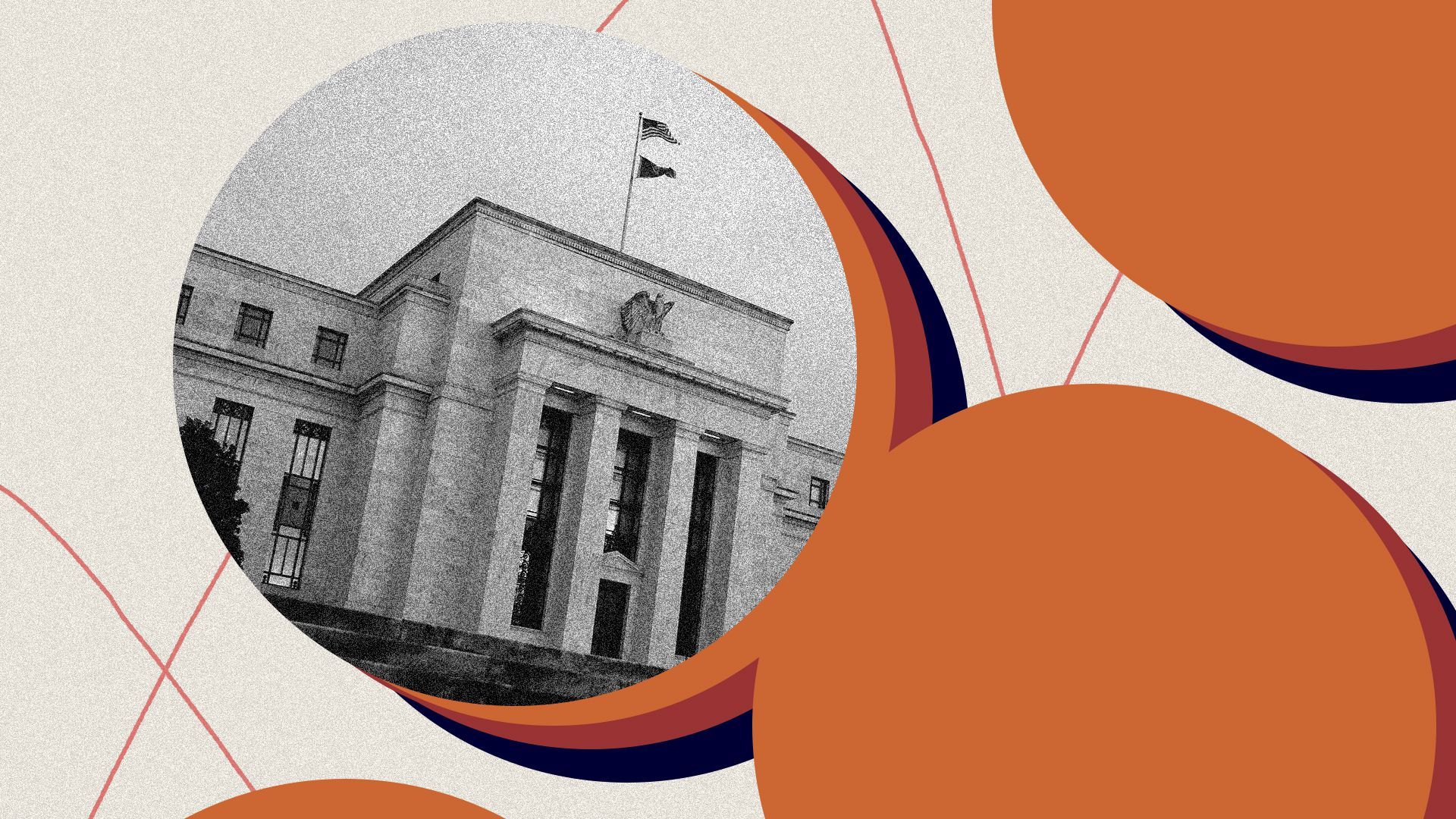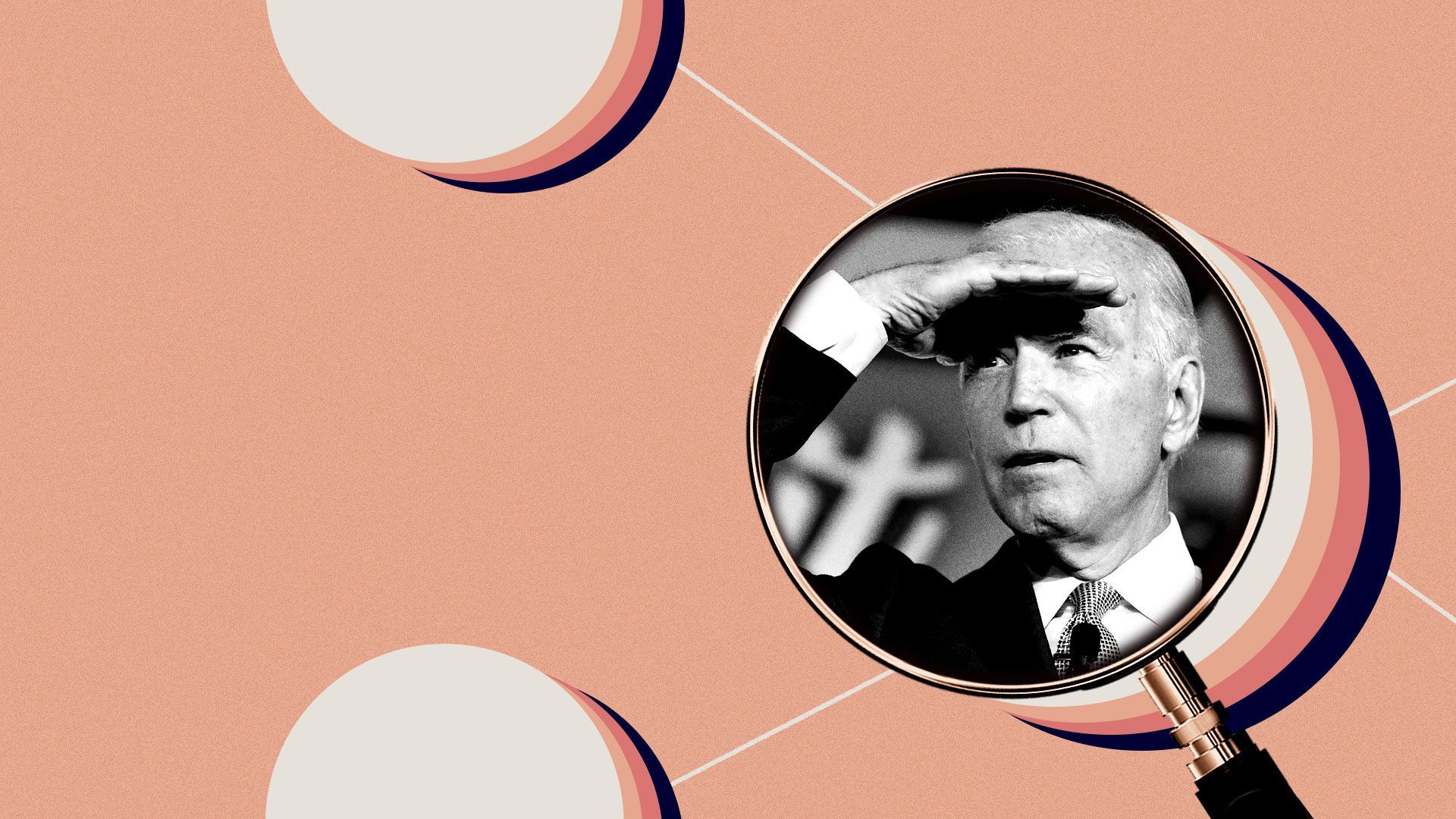| |
| |
| |
| Presented By Northern Trust |
| |
| Axios AM Deep Dive |
| By Mike Allen ·Apr 03, 2021 |
| Good afternoon and welcome to a Deep Dive by the Axios business team, led by managing editor Aja Whitaker-Moore, on the Federal Reserve — one of the most important economic stories in the world. - For more on how the Fed has changed the economy and our lives, check out this episode of the "Axios Re:Cap" podcast with Axios' Dan Primack, Felix Salmon and Courtenay Brown.
Smart Brevity™ count: 1,132 words, or 4 minutes. |
| |
| |
| 1 big thing: To infinity and beyond |
 |
|
| Photo illustration: Annelise Capossela/Axios. Photo: Stefani Reynolds/Bloomberg via Getty Images |
| |
| We're not in the throes of a "Greater Depression," and we're not facing a tsunami of bankruptcies. In fact, the stock market is hitting new record highs, while employment is rising fast. For all of these things, thank one institution above all others: the Federal Reserve, Axios chief financial correspondent Felix Salmon writes. Why it matters: The coronavirus crisis has made abundantly clear the awesome power of central banks in general and of the Fed in particular. The big picture: Most of the time, the Fed is a deliberately slow and quiet agency, keeping a close eye on thousands of economic indicators and trying its best to keep employment high and inflation low. - In a crisis, however, the Fed has now shown beyond any doubt that it is both willing and able to create as much liquidity as is needed to put out all fires and get the economy floating happily again.
- As Minneapolis Fed Chair Neel Kashkari memorably put it on "60 Minutes" in March 2020: "There is an infinite amount of cash in the Federal Reserve. We will do whatever we need to do to make sure there's enough cash in the banking system."
How it works: The Fed, working hand in glove with the Treasury, announced a long list of programs in March 2020, all of which were designed to stabilize extremely jittery markets and make sure that creditworthy businesses had access to the capital they needed to get through the crisis. - The programs worked better than anyone initially dared to hope — in fact, they worked so well that many of them barely needed to be used. The sheer fact that the Fed was willing to step in sufficed to get the private markets lending again.
- Investors celebrated.
- Setting interest rates at zero also gave investors every incentive to focus on large future profits (think fast-growing technology companies and other speculative investments) rather than concentrating on present-day cash flows.
The downside: Businesses are mostly owned by the rich, who got richer even as total employment plunged during the crisis. - There is moral hazard involved in bailing out risk-takers rather than forcing them to suffer losses. And stocks are now so expensive that the Fed risks having to fight yet another crisis should the current bubble burst chaotically.
Subscribe to Felix's weekly Axios Capital newsletter. |
    |
| |
| |
| 2. Fed takes on race and climate |
 |
|
| Photo illustration: Aïda Amer. Photos: Robert Gauthier/L.A Times, Stephen Maturen/Getty Images |
| |
| Historically untouchable issues — like climate change and race — are now on the table for the Fed as it wades further into uncharted territory, writes Axios Closer author Courtenay Brown. Why it matters: The about-face has implications for how one of the world's most influential economic bodies steers policy and regulates the nation's banks. The Fed recently set up two committees to look at the impact of climate change on the economy and banks. - It may feel small, particularly for issues that have threatened and plagued the country for years.
- But it's a big deal for an institution that rarely — if ever — spoke publicly about these issues, let alone interwove them into considerations about the economy.
On climate: The Fed is behind its peers around the globe where climate change is less politicized. On race: Fed officials have implied that the national unemployment rate wouldn't be the only jobless measure they look at when measuring the health of the economy. What to watch: Resistance from Republicans. - The latest: Sen. Pat Toomey, the top Republican on the powerful Senate Banking Committee, warned this week of "mission creep" at the Fed's regional banks, pointing to their research on topics like climate change and racial justice.
Go deeper. |
    |
| |
| |
| 3. Everything old is new again |
 Chart: Danielle Alberti/Axios Not all instances of easy money cause asset price bubbles — but all asset price bubbles for the past 250 years have been associated with loose monetary policy, Felix writes. In fact, it's almost impossible to find a bubble since 1770 that isn't associated with lax monetary policy. - The current run-up in both stock prices and real estate has many observers diagnosing a bubble.
The big picture: Not all bubbles end in crises, although many do — at which point the very central banks that fueled the bubble are generally tasked with cleaning up the mess. Go deeper. |
    |
| |
| |
| A message from Northern Trust |
| The wealth planning trifecta |
| |
 |
| |
| The confluence of record low interest rates, high exemption amounts and an uncertain future for tax policy make it an urgent time to revisit your wealth plan. Take advantage of this window of opportunity with strategies from Northern Trust. Act now. |
| |
| |
| 4. The money spigot |
 Data: Yardeni. Chart: Danielle Alberti/Axios "For central banks, I don't think there is any alternative to what they've been doing until now, namely vastly significantly support the economy," former European Central Bank president Mario Draghi told Axios in December. "Support, in my view, will continue for quite a long time." |
    |
| |
| |
| 5. Bonus poll: Not trusting the Fed |
 Data: Axios/Ipsos poll; Chart: Will Chase/Axios For all its impact on the U.S. economy, more than three-fourths of Americans say they know "a little" or less about how the Fed operates and what it does, according to a new Ipsos poll for Axios. - Why it matters: People who say they don't understand the Fed are more likely to say they don't trust what the Fed is doing.
|
    |
| |
| |
| 6. Playing politics with economic policy |
 |
|
| Illustration: Eniola Odetunde/Axios |
| |
| The modern Fed is designed to operate free of political pressures, as codified in a 1951 agreement with the Treasury Department. That gives monetary policy to the Fed and fiscal policy to Treasury, writes Axios business editor Dan Primack. Reality check: The president nominates Fed chairs and governors, who don't have lifetime appointments like Supreme Court justices. So politics has always had some influence. What's changed: Former President Trump regularly blistered the Fed and Chairman Jay Powell, who was picked by Trump himself. It raised concerns that Fed politicization would become the new norm. - Powell publicly brushed off Trump's attacks. But Fed policy did become more Trumpian (looser), particularly in response to COVID.
President Biden appears to be honoring pre-Trump etiquette by not publicly commenting on Fed decisions. - That means any monetary politicking will be done in backrooms, likely by Treasury Secretary Janet Yellen, who was Powell's predecessor at the Fed.
Subscribe to Dan's daily deals newsletter, Axios Pro Rata. |
    |
| |
| |
| 7. Biden plans for board openings |
 |
|
| Illustration: Eniola Odetunde/Axios. Photos: Frederic J. Brown/Getty Images |
| |
| Fed watchers eager to know what President Biden has planned for the agency's top job will likely have to wait until at least this summer, since Jerome Powell's current term as chair doesn't expire until early 2022. - How Biden fills other open positions will offer clues, Axios' Kia Kokalitcheva reports.
State of play: Reappointing Powell looks logical. But other possible picks include board member Lael Brainard or Raphael Bostic, who leads the Atlanta Fed. The big picture: The administration is considering Michigan State economist Lisa Cook to fill an open seat that's been vacant since Janet Yellen's resignation in 2018, Axios' Hans Nichols reported in February. - Cook is considered "dovish," meaning she's more concerned with improving employment levels and keeping interest rates low than with inflation.
What's next: Biden will also have the opportunity to fill board member Randal Quarles' position as vice chair of supervision when his tenure ends in October. - When Richard Clarida's terms as both a board member and vice chair expire in January 2022, more slots will be up for grabs.
The bottom line: Even without making a change at the top, Biden can steer the Fed's future. |
    |
| |
| |
| A message from Northern Trust |
| The tax efficient investor: preparing portfolios for change |
| |
 |
| |
| Should you realize capital gains given possible tax policy changes? Learn the potential impact of higher taxes on your portfolio and explore tax efficient strategies — including for unrealized gains — for both current and possible tax environments. Ready for reform? |
| |
| 🔔 Sign up here to get Axios Closer, Courtenay Brown's happy-hour business briefing. |











No comments:
Post a Comment